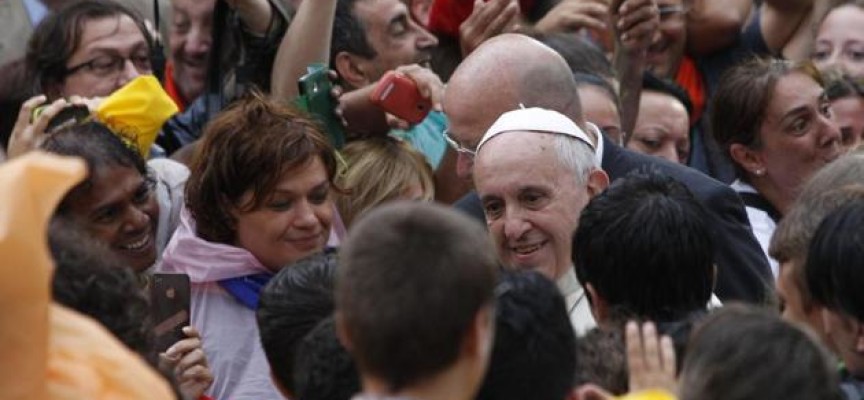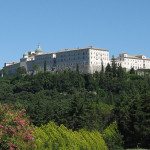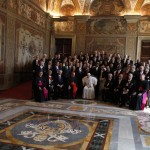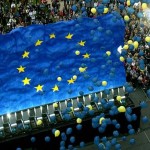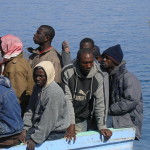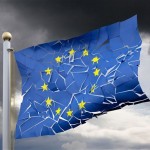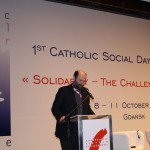Pope Francis chose a special place to rouse Europe from its torpor: St. Mary’s Basilica in Trastevere, where the Community of Sant’Egidio attends its services. In simple words, Pope Francis called the European malaise by its name: “People that do not watch over their elderly, do not care about their youths, are people without a future, people without hope”. Because “youths – children, young people in general – and the elderly bring history forward”. A beautiful picture, which is realized on a daily basis by the Community of Sant’Egidio, where the difference between the ones who give help and those who receive help through a ‘hug’ is almost blurred.
The way in which the elderly and the children are treated is an indicator of the quality of a society, the Pope said, adding a critical remark, which has rarely been so straightforward in this regard: children are thrown away, the Bishop of Rome said, referring for example to the birth rates of Italy or Spain. And the elderly are thrown away with an attitude “behind which there is a hidden euthanasia”. What is useless, they simply throw it away, and the same is true for the 75 million young people under 25 who neither work nor study.
Europe is not getting older, the Pope said, Europe is tired. We need to help Europe to become young again, to revive its disowned roots. One of the paths to rejuvenation leads to the “new Europeans”, the migrants arrived after “painful and risky journeys”: “The stranger is our brother, whom you should know and help.” And the Pope did not hesitate to use the word revolution, an actual revolution of “compassion and tenderness”, to have friendship grow instead of hostility and indifference. According to Pope Francis, such revolution revolves around three pillars: prayer, devotion to the poor, work for peace, basically all things that movements like the Community of Sant’Egidio have been promoting for quite some time.
The Pope wants our society to change starting from the poor and the elderly. He even referred to the poor as being “the cornerstone of society”; those poor, whom a “speculative economy” is making even poorer, stripping them of their basic needs, like a house and a job. For Pope Francis there is only one word to define all this: “Unacceptable!” There are many who want to lay stress on the word “solidarity”, which for a specific culture seems to be a bad word. But solidarity “is a Christian word”.
Quite a lot of “fresh air” is coming from Rome. Not everybody will be pleased with it, both from the right and from the left. But the words spoken by the Pope in Trastevere have much to do with the essence of the Gospel: “Whoever looks upon the Lord sees the others …”.
Papst Franziskus hat sich einen besonderen Platz ausgesucht, um Europa ein wenig auf die Sprünge zu helfen: Die Marienbasilika in Trastevere, wo die Gemeinschaft Sant’Egidio ihre Gottesdienste hält. In einfachen Worten hat Papst Franziskus die europäische Malaise beim Namen genannt: „Ein Volk, das seine Alten nicht behütet, das sich nicht um seine Jungen sorgt, ist ein Volk ohne Zukunft, ein Volk ohne Hoffnung”. Denn: „Die Jungen – die Kinder, die Jugendlichen – und die Alten bringen die Geschichte voran”. Ein schönes Bild, das in der Gemeinschaft Sant’Egidio tagtäglich verwirklicht wird, wo der Unterschied zwischen dem, der hilft, und dem, dem geholfen wird, gleichsam in einer „Umarmung” verschwimmt.
Die Behandlung der Alten und der Kinder ist ein Indikator für die Qualität einer Gesellschaft, sagte der Papst und fügte eine kritische Anmerkung hinzu, die in dieser Schärfe selten formuliert wird: Man wirft die Kinder weg, meinte der Bischof von Rom unter Bezugnahme auf die Geburtenzahlen etwa in Italien oder Spanien. Und man wirft die Alten weg, mit Haltungen, „hinter denen eine verborgene Euthanasie steht”. Was nicht nützt, werfe man weg, auch die 75 Millionen jungen Leute unter 25, die weder arbeiten noch studieren.
Europa sei nicht gealtert, sagte der Papst, es sei müde. Man müsse diesem Europa helfen, wieder jung zu werden, seine verleugneten Wurzeln zu finden. Einer der Wege der Verjüngung seien die „neuen Europäer”, die nach „schmerzlichen und risikoreichen” Fahrten angelangten Migranten: „Der Fremde ist unser Bruder, den man kennen soll und dem man helfen muss”. Und der Papst scheute nicht davor zurück, das Wort Revolution in den Mund zu nehmen, die wahre Revolution der „Compassion und der Zärtlichkeit”, damit an Stelle der Feindschaft und der Gleichgültigkeit die Freundschaft wächst. Das Programm dieser Revolution kreist für Papst Franziskus um die drei Elemente Gebet, Hinwendung zu den Armen, Einsatz für den Frieden, im Grunde das, was Bewegungen wie die Gemeinschaft Sant’Egidio seit geraumer Zeit tun.
Der Papst möchte die Gesellschaft von den Armen und den Alten her verändern. Ja, er bezeichnet die Armen als „Eckstein der Gesellschaft”; jene Armen, denen eine „spekulative Wirtschaft” immer ärmer mache und denen sie das Wesentliche – wie Wohnung und Arbeit –vorenthalte. Dafür hat Papst Franziskus ein einziges Wort: „Unannehmbar!” Es gebe viele, die das Wort „Solidarität” streichen wollen, für eine bestimmte Kultur scheine es ein Schimpfwort zu sein. Aber Solidarität sei ein christliches Wort.
Ziemlich viel „frischer Wind” aus Rom. Wird nicht allen gefallen, sowohl rechts wie links. Aber die Worte des Papstes in Trastevere haben viel mit der Essenz des Evangeliums zu tun: „Wer auf den Herrn schaut, sieht die anderen…”.
Aria fresca per l’Europa
Papa Francesco ha scelto un posto speciale per destare un po’ l’Europa: la basilica di Santa Maria in Trastevere, dove la Comunità di Sant’Egidio s’incontra. In parole semplici Papa Francesco ha chiamato il malessere europeo per nome: “Un popolo che non custodisce i suoi anziani, che non si prende cura dei suoi giovani è un popolo senza futuro, un popolo senza speranza”. Perché “i giovani – i bambini, i giovani – e gli anziani portano avanti la storia”. Una bella immagine, che viene realizzata quotidianamente dalla Comunità di Sant’Egidio, dove si confonde la differenza tra chi aiuta e chi è aiutato in un “abbraccio”.
Il trattamento degli anziani e dei bambini è un indicatore della qualità di una società, ha detto il Papa, aggiungendo un’osservazione critica, che è formulata soltanto di rado in maniera tanto drastica: si scartano i bambini, ha detto riferendosi al numero delle nascite per esempio in Italia e in Spagna. E si scartano gli anziani, con atteggiamenti “dietro ai quali c’è un’eutanasia nascosta”. Quello che non serve si scarta, anche i 75 milioni di giovani sotto i 25 anni che in Occidente non hanno ne lavoro né studio.
L’Europa non è invecchiata, ha detto il Papa, è stanca. Bisogna aiutare quest’Europa a ringiovanire, a trovare le sue radici rinnegate. Uno dei modi di ringiovanimento sono i “nuovi europei”, i migranti giunti dopo “viaggi dolorosi e rischiosi”: “Lo straniero è nostro fratello da conoscere e da aiutare”. E il Papa non ha esitato a usare la parola rivoluzione, una vera rivoluzione di “compassione e tenerezza” affinché al posto di inimicizia e indifferenza cresca l’amicizia. Il programma di questa rivoluzione, per papa Francesco, ruota attorno a tre elementi: preghiera, aiuto ai poveri, impegno per la pace. In fondo è ciò che movimenti come la Comunità di Sant’Egidio fanno da un bel po’ di tempo.
Il Papa vuole cambiare la società iniziando dai poveri e dagli anziani. Ha perfino chiamato i poveri “la pietra d’angolo della società”; quei poveri che una “economia speculativa” rende sempre più poveri privandoli dell’essenziale come la casa e il lavoro. Papa Francesco per questo ha un’unica parola: “Inaccettabile”. Ci sono molti che vogliono togliere la parola “solidarietà”, per una certa cultura sembra essere una parolaccia. Ma la solidarietà “è una parola cristiana”.
Viene abbastanza “aria fresca” da Roma. Che non piacerà a tutti, sia a destra sia a sinistra. Ma le parole del Papa a Trastevere hanno molto a che fare con l’essenza del Vangelo: “Chi guarda il Signore vede gli altri…”.
Erich Leitenberger
Spokesman "Pro Oriente" Foundation, Austria
Latest posts by Erich Leitenberger (see all)
- A special journey - 24 novembre 2014
- A day of deep mourning - 29 luglio 2014
- Some fresh air for Europe - 17 giugno 2014

